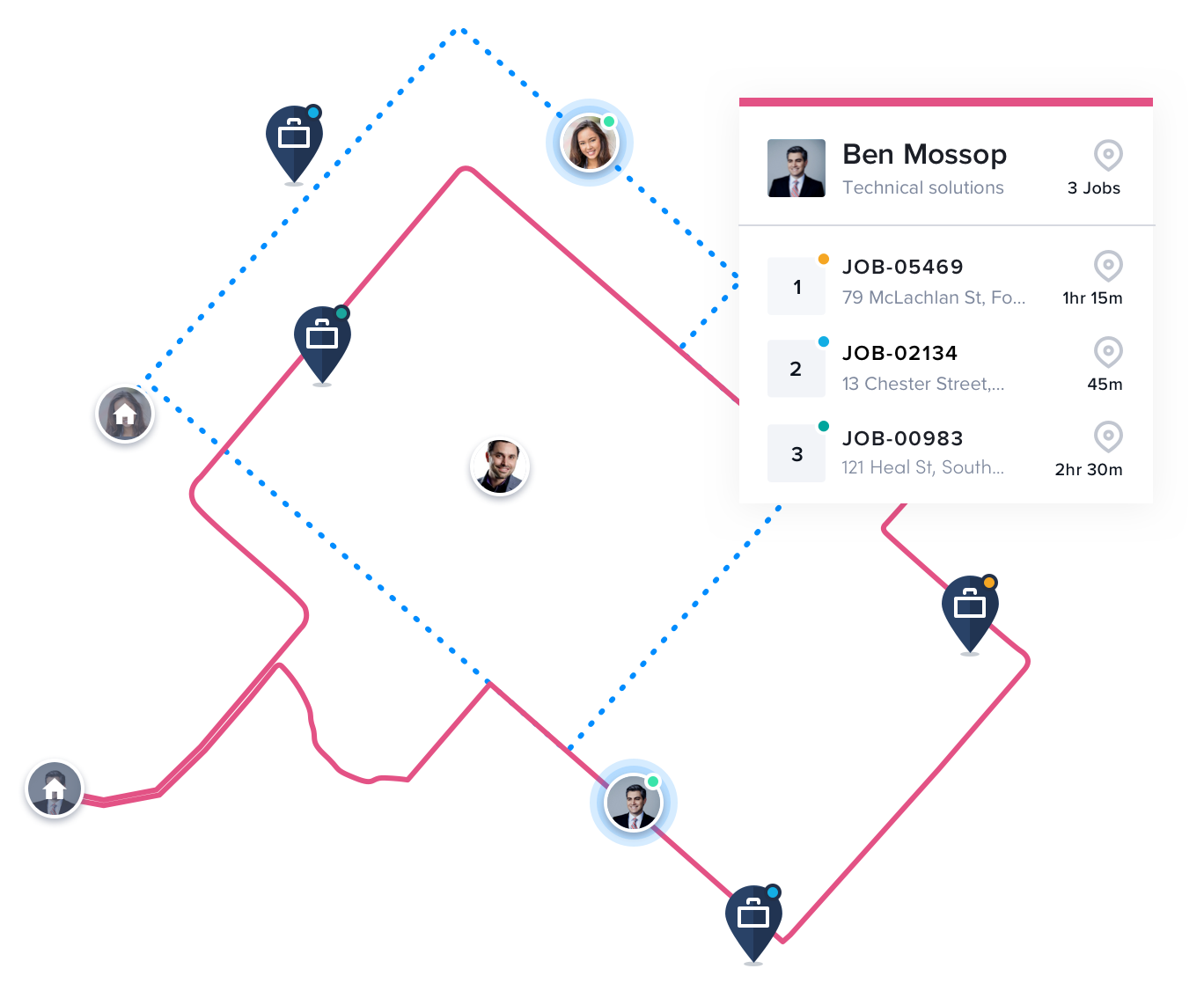Here’s what we’ll cover:
- What Is Field Service?
- What is Field Service Management?
- Why is Field Service Management Important?
- The Benefits of Field Service Management
- What is Field Service Management Software?
- What does a Successful Field Service Operation Look Like?
- FSM vs. Mobile Workforce Management: What’s the Difference?
- The Present and Future of Field Service Management
- Choosing the Right Field Service Management Software
What Is Field Service?
Field service refers to jobs performed out in the field, as opposed to on company property. Field service requires dispatching workers or contractors to specific locations (typically the customer’s location) to sell, install, repair, or maintain equipment or systems.
Field service practitioners, or field workers, are often technicians who deliver skilled, specialized, or even proprietary services to commercial or industrial clients.
When most people think of the field service industry, they think of setting up cable TV or seeing an electrician work on a downed power line. But the field service landscape is quickly evolving to include a broader range of deskless employees: healthcare workers, salespeople, inspectors, and more. In fact, 80% of the world’s workforce is now deskless, and field service has expanded into education, healthcare, hospitality, and beyond.
What is Field Service Management?
Field service management is the process of overseeing and optimizing the organization’s workers, equipment, service, and operations out in the field. Field service management incorporates processes like assigning and scheduling work orders, dispatching workers to new assignments, communicating with field workers on the job, managing product inventory, and collecting data from the field.
By optimizing their field service management, companies can streamline workforce operations, improve productivity, and simplify daily life—not only for field workers on the job site, but also for administrative staff back in the office.
As the field service industry becomes more complex, field service management is even more important:
- Industries including mobile healthcare, real estate, and sales have started to use field service principles and tools in their mobile work.
- Blended workforces, which include full-time employees and independent contractors working side-by-side, require tools that can provision access and permissions based on the worker’s role.
- Flexible work patterns accommodate customers’ needs beyond the standard 9-5 schedule of the past, making scheduling workers (and accommodating scheduling preferences) more complex than ever.
Why is Field Service Management Important?
For many organizations, the most important functions of the business happen outside of company property. As technology has evolved, so has the complexity of the types of services that happen in the field, and, just as importantly, how those services are managed.
In order for a company to stay competitive, modern field service management is vital. In addition to the traditional functions of FSM, such as assigning and scheduling work, dispatching, routing, and communicating with with workers in the field, modern field service management can be deployed to meet the following operational challenges:
- High overhead costs
- Long billing cycles
- Inefficient scheduling and dispatching
- Lack of visibility into field operations
- Lack of communication and collaboration
- Inability to collect, analyze, and share valuable data
- Employee retention
- Regulatory compliance
With so many vital business operations falling under the umbrella of field service management, getting field service management right is critical to success.
The Benefits of Field Service Management
Managing your field workers requires unique processes, tools, and considerations. But the investment can be well worth it, as your field workers—and overall business—reap some key benefits:
-
- Increased productivity – Modern field service management tools and processes replace manual systems, boosting both operational efficiency and employee productivity.
- Improved visibility – Software helps collect, track, and analyze crucial data (like job completion times, expenses, and field notes), driving better business decisions.
- Optimal employee experience – Relieved of administrative burdens, field workers can easily access essential resources, communicate effectively, receive schedules and updates in one centralized place, and spend more time focusing on what really matters: customers.
- Lower overhead costs – More efficient scheduling, dispatching, inventory management, and communicating means overhead costs go down. These savings translate into better benefits for employees, lower prices for customers, and healthier profit margins.
- Improved customer experience – Modern field service management helps ensure that the right worker arrives at the right place at the scheduled time. FSM helps work get done faster and more efficiently, and streamlines billing cycles.
For companies that install, maintain, sell, or repair products in the field, field service software pays for itself in the form of efficiency, customer satisfaction, and employee retention.
These advantages are certainly within reach for companies looking to optimize for installation, maintenance, and repair of products by way of field service industry software solutions.
What is Field Service Management Software?
Field service management software is technology designed to manage, track, control, and automate field service activities.
Because field service management balances so many essential operations across a blended workforce, modern organizations turn to field service software to stay ahead of the curve. Field service software and mobile apps are designed to streamline communication, automate scheduling, and improve dispatching and general information-sharing between field workers and the back office.
Modern FSM tools need dynamic functionality—like real-time communication with deskless employees plus seamless scheduling and dispatching for new assignments—to maximize productivity and keep up with the shifting landscape of the field service industry.
What Does a Successful Field Service Operation Look Like?
In today’s dynamic business environment, competition is stiffer and customer expectations are higher. Field service operations must be nimble so your workers can provide outstanding service at a moment’s notice and your customers know exactly what to expect from employees in the field.
A successful field service operation should be:
- Mobile-first. Deskless workers should be able to accomplish their tasks without jumping through hoops. Make sure your FSM tools are accessible (and compatible) with the tools your employees use in the field, including their own mobile devices.
- Integrated with other systems. Whatever your FSM solution, it should work seamlessly with the other systems you use. Make sure your field service operation works in tandem with your CRM, HR system of record, IT system, payroll software, etc.
- Capturing data in real time. Back in the day, administrators were in the dark until field workers came back at the end of the day with a stack of signed paperwork. A modern FSM system should share data in real time so your back office is always equipped with up-to-the-minute information.
Successful field service management looks different for different industries and business models. Some components of FSM, such as tracking the location of company equipment, are critical for certain organizations but are a lower priority for others. Meet with your stakeholders—both internal and external—to determine your company’s priorities and make sure your FSM solution has the tools you need most.
FSM vs. Mobile Workforce Management: What’s the Difference?
Field service management and mobile workforce management (MWM) are closely related, but there are key differences to consider when choosing a solution for your business.
The difference between mobile workforce management and field service management software is best summarized by this question:
Are you trying to optimize your business for human inputs or physical products?
If you want to optimize the customer journey, the scheduling process, or employee experience and productivity in the field, you need a mobile workforce management solution. MWM software puts your customers and blended workforce employees at the center of the process because they are the key variables in the equation that you are looking to solve.
If you want to optimize the installation, maintenance, repair, and deployment of physical products you own or have sold, you need a field service management solution. FSM software is designed to prioritize physical assets, helping you coordinate the cadence and timing of your jobs to keep equipment in optimal shape.
The Present and Future of Field Service Management
Field service management has been undergoing a massive evolution. Mobile solutions have replaced the traditional paper forms of and log books of years past. Although the digital transformation of field service has drastically increased efficiency, productivity, ROI, customer and employee satisfaction, and more, it’s not without challenges to service providers: as the technology improves, customers demand more.
The modern field service customer expects:
- Scheduling through an online portal
- Precise scheduling
- Ability to choose a preferred technician
- Job status updates and tracking
In order to meet these needs, field service managers need an all-in-one field service solution for truly modern field service operations, that manages a mobile workforce, customer preferences, scheduling, dispatching, and communication needs, in one streamlined system.
And of course, field service management technology won’t stop evolving. If anything, it will continue to transform at a faster rate. We predict the future of field service management will be marked by:
- Growth in AI and the IoT
- Smart Devices Displacing Legacy Tech
- Increased automation
- Proactive data analysis
Choose the Right Field Service Management Software
If you’re looking to better manage your field service operations, you’ll need field service management software that provides the right tools for your deskless workers. A great field service management solution can automate schedules, improve communication, increase productivity, and more—all in one centralized location.
Learn more about what to look for in a field service management solution, or book a demo to see Skedulo’s field service scheduling and dispatching software for yourself.

